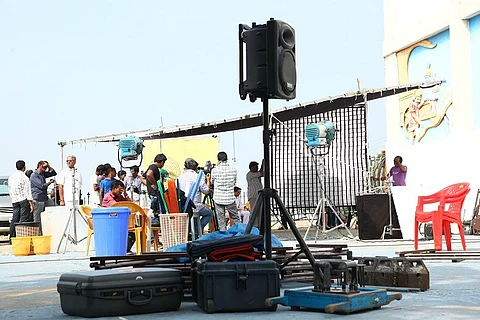

The Telangana government-constituted high-level committee, which is looking into the issue of sexual harassment in Tollywood, held its second meeting on Friday and has come out with certain concrete steps to tackle the pervasive issue of abuse across the industry.
The committee constitutes of 25 members, including those from the film fraternity, lawyers, professors, activists and police officials. In its second meeting, the members have sought reforms on defining the bodies that come under the Telugu film industry and also bring regulations that will provide more transparency to the internal mechanisms of any production house.
Speaking to TNM, N Vasanthi, professor at the NALSAR University of Law and also a member of the committee, said that the major suggestion put forward in the meeting held on Friday was to bring about a mechanism where every film unit - be it a feature or a short film or a television soap - has to mandatorily register their whereabouts. This is to ensure that in case of fraud or abuse in future, there is enough material evidence to suggest the existence of the work unit.
“This is an era where a film can be even shot on a mobile phone camera. At present, the only body that stands in between the production of a film and its release is the Central Board of Film Certification (CBFC). Therefore, every production unit should register the details of their project with an authorised body before beginning the work. This is not to regulate the functioning of a unit but rather to ensure there is more information in the public domain about the artistes and basic facilities are provided so that the question of duping artistes reduces and there is proof that a project was ever underway,” Vasanthi says.
She further points out that there are over half-a-dozen regulatory bodies in the Telugu film industry but they are all largely self-regulated, except the CBFC.
“For example, in the case of the television industry, there is absolutely no mechanism to regulate working bodies. Therefore, in case of an unfortunate incident, artistes don’t know whom to hold accountable. Even at the anti-sexual harassment panel that was set up last year, there is no documentation yet on the complaints received. First comes prevention and then redressal. So we are working towards making the industry more transparent,” the professor says.
Also, the only production house that has set up and announced an Internal Committee (IC) is Anapurna Studios. Despite the anti-sexual harassment law, production houses are still in its early stages of forming an IC, Vasanthi points out.
The first task of the committee is to map the industry, Vasanthi says. And to define the industry is the biggest challenge we are facing, she adds.
“We are forming a sub-committee in this regard to understand what comes under the scope of an industry. The film industry is too vast, constituting acting schools, artistes associations, film sets, audition spaces, etc. We have given ourselves a three-month time period to analyse and submit the report to the higher committee,” says Vasanthi.
There is also a lot that has to be done for the security of the junior artistes, who enter the industry in large numbers every year.
“Junior artistes are treated like animals in any industry. The agent who procures them takes a big cut off their daily wages. Even if the producer pays them Rs 700, only Rs 400 is paid to the artistes. Since they do not even sign contracts, we are planning an app or a website where such artistes can enrol themselves,” Vasanthi explains.
Although in 2014, the Supreme Court allowed women to work as make-up artistes in Bollywood, Tollywood, like other film industries, still does not have a single woman makeup artiste as they are not allowed to be a part of the make-up artistes association. Women actors in the industry, for this reason, mostly bring along with them their own set of make-up artistes.
“Apart from this, we are also trying to make the entry fees cheaper for women into the various film bodies. At present, the television artistes association demands an entry fee of Rs 25,000 while the Movie Artistes Association (MAA) charges Rs 1 lakh,” Vasanthi adds.